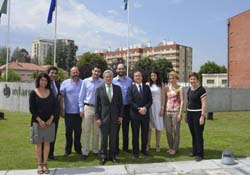Greece and Portugal exchange experience and good practices in health technology assessment (HTA)

Infarmed
Under the strengthening capacity for universal coverage (SCUC) initiative, WHO/Europe organized a study visit to Portugal for Greek policy-makers on 6–8 July 2016, to provide an overview of the functioning of a well established HTA agency in a European country of comparable size and with similar economic, social and cultural conditions.
The delegation, under the auspices of the Greek Ministry of Health, comprised representatives of the Ministry of Health, the national drug agency (EOF), the positive list committee, the National School of Public Health, and the School of Medicine of the Aristotle University of Thessaloniki. The two-day programme included:
- a general presentation on Portugal’s National Authority of Medicines and Health Products (INFARMED);
- overviews of the Portuguese pharmaceutical sector and the organization and procedures of HTA, including pharmaceutical and pharmacoeconomic assessment, negotiation and contract arrangements;
- presentations on the new HTA system, medicine pricing and the reimbursement framework in Portugal;
- an analysis of the impact of the memorandum of understanding with institutions (the European Union, European Central Bank and International Monetary Fund) on medicine use and expenditure in Portugal;
- a discussion of implemented and scheduled reforms in the pharmaceutical sector and their actual and anticipated impact; and
- a meeting with members of the INFARMED Executive Board.
Developing capacity for HTA is a priority for the Greek Government and will be an important component of a more comprehensive reform of governance of the pharmaceutical sector. The Greek delegation considered the Portuguese system a useful example of applying the principles and practices of HTA. Additional bilateral follow-up activities and further cooperation in this area, supported by WHO/Europe, are expected after the Greek Government decides on the model and timetable for introducing HTA.
Background
SCUC activities are carried out with funding from the European Union through a grant agreement between the European Commission and WHO/Europe. The broad objective is to contribute to improving health and health equity in Greece, especially among the most vulnerable groups in the population, by helping the Greek authorities to move towards universal health coverage and to strengthen the effectiveness, efficiency and resilience of their health system.



